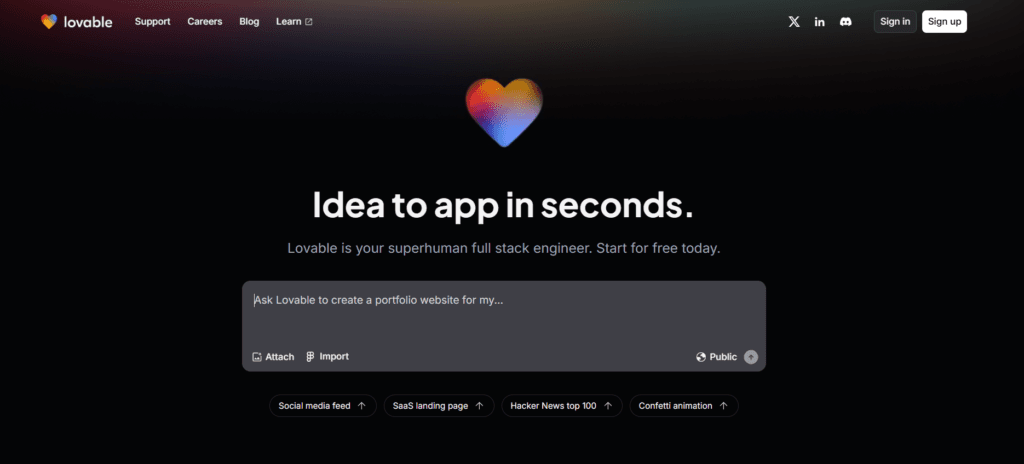Creating an app used to take weeks of coding, debugging, and testing. Now, with AI-driven tools, you can describe your idea in a single sentence, and the system will handle everything—backend, interface, and even bug fixes. This shift is changing how businesses and creators bring their ideas to life.
The Evolution of AI-Powered App Builders
App development has always been resource-intensive. Writing code, configuring databases, managing servers, and fixing bugs require specialized knowledge. AI-powered app builders eliminate these steps, allowing anyone to create a functional app without coding skills.
With tools like Lovable.dev, you simply describe your idea, and AI generates a complete app structure. Whether it’s a prompt library, a note-taking app, or an e-commerce store, the system builds it—handling both frontend and backend.
Lovable.dev was formerly known as GPT Engineer, a tool that had multiple relaunches before reaching its current success. The company rapidly grew to millions in annual revenue within weeks, proving the increasing demand for AI-driven development solutions.

Lovable.dev: Features and Capabilities
1. Text-to-App Generation
Lovable.dev creates web apps from plain text prompts. It structures responsive UI layouts using shadcn/ui and tailors each page based on user input. The generated interface includes layouts, components, and relevant content.
2. Supabase Integration
The tool seamlessly integrates with Supabase, allowing users to add authentication and databases without manual setup. This ensures that apps store user data and maintain persistent information.
3. Publishing & Sharing
With built-in deployment features, users can share their projects instantly. The preview and sharing options allow for real-time feedback and iteration. Projects can also be integrated with GitHub, making collaboration and version control easier.
4. Real-Time Editing and Version Control
Users can edit individual sections of their apps without affecting the entire project. Lovable.dev maintains a version history, allowing developers to revert changes easily and keep track of improvements over time.
Who Benefits from AI App Builders?
Entrepreneurs
AI-powered tools help founders build MVPs quickly. Instead of hiring developers, they can test business ideas with minimal investment.
Developers
While AI doesn’t replace coding, it speeds up prototyping. Developers can generate UI components and backend logic instantly, then refine them as needed.
Consultants
Consultants can offer clients faster solutions. AI-generated apps allow them to deliver working models without extensive development time.
Startups and Small Teams
For businesses with limited resources, AI-powered development tools reduce costs and speed up product launches, allowing teams to focus on refining user experience and scaling operations.
How AI App Builders Work
- Describe Your App – Provide a short prompt detailing what you want.
- AI Generates the Backend – The system creates the logic, API connections, and database.
- User Interface is Designed – The tool structures the app’s layout based on best practices.
- Bug Fixes and Optimization – The AI refines and tests everything automatically.
- Deployment & GitHub Integration – Users can publish apps instantly and sync with GitHub for further customization.
- Database Integration – AI-powered tools connect to Supabase, storing data efficiently and enabling features like user authentication.
This process significantly reduces development time, making app creation more accessible.
Comparing AI App Builders
Lovable.dev vs. Bolt.new
Lovable.dev focuses on rapid prototyping with an intuitive UI, while Bolt.new is geared toward full-stack development. Lovable.dev is ideal for non-technical users, while Bolt caters to developers needing deeper control over their projects.
Alternatives
- Banani – Best for UI prototyping and multi-screen designs.
- v0 – Generates copy-and-paste React code for custom interfaces.
- Cursor – Assists with specific code segments rather than full projects.
Each of these tools has its strengths, but Lovable.dev stands out for its ease of use and powerful backend integration.
Limitations and Considerations
While AI-powered app builders are powerful, they have some limitations:
- Design Complexity – Custom animations, unique interactions, and highly detailed UI elements still require manual refinement.
- Pricing and Usage Limits – Tools like Lovable.dev operate on a credit-based system, meaning heavy users may need higher-tier plans.
- Scalability – AI-generated apps work well for prototypes and small projects but may require additional optimization for enterprise-level use.
- Control Over Code – While Lovable.dev allows GitHub integration, developers working on complex projects may still prefer full control over their codebase.
Advanced Features and Future Potential
Automated Testing and Debugging
AI-powered app builders are evolving to include more advanced debugging tools, helping developers identify and fix issues more efficiently.
Custom AI Models and Data-Driven Enhancements
Future versions of AI app builders may allow users to train their own models for specific app behaviors, improving personalization and performance.
Enterprise-Ready Features
As businesses look for more scalable solutions, AI app builders may integrate with additional cloud services, automation tools, and security enhancements.
Task Automation and Workflow Management
AI-assisted tools like Lovable.dev can also be used for task automation, integrating with business workflows to improve efficiency and reduce manual effort.
What’s Next for AI in App Development?
AI is reshaping software development, but it’s not stopping here. Future innovations could include:
- More advanced customization options for AI-generated designs.
- Deeper integrations with third-party APIs and automation tools.
- Smarter debugging and error-handling capabilities.
- Faster AI-driven optimization to refine app performance based on user behavior.
App creation is becoming more accessible than ever. Whether you’re an entrepreneur testing an idea, a developer streamlining your workflow, or a consultant delivering faster results, AI-powered tools are changing how software is built. Try one today and see where your next idea takes you.
